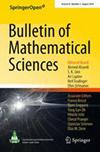可解群中的丢番图问题
IF 2.5
2区 数学
Q1 MATHEMATICS
引用次数: 17
摘要
研究了不同种类的有限生成可解群(幂零群、多环群、亚元群、自由可解群等)中的Diophantine问题(有限方程组的可决性),这些群满足一些自然的“非交换性”条件。对于这些类中的每一组[公式:见文],我们证明存在一个代数整数环[公式:见文],它可以用有限方程组([公式:见文]-可解释)在[公式:见文]中解释([公式:见文]-可解释),因此[公式:见文]中的丢芬图问题在多项式时间上可约化为[公式:见文]中的丢芬图问题。数论中一个主要的公开猜想是,丢番图问题在任何这样的[公式:见原文]中都是不可判定的。如果这是真的,这就意味着丢番图问题在任何这样的〔公式:见原文〕中也是不可判定的。进一步,我们证明了对于上面的许多特殊群[公式:见文],环[公式:见文]与整数环[公式:见文]同构,因此[公式:见文]中的丢番图问题确实是不可判定的。这尤其适用于自由幂零或自由可解的非阿贝尔群,以及非阿贝尔广义海森堡群和单三角群[公式:见文本]。然后,我们将这些结果应用于包含非虚阿贝尔极大有限生成幂零子群的非可解群。例如,我们证明丢番图问题在群中是不可判定的[公式:见原文]。本文章由计算机程序翻译,如有差异,请以英文原文为准。
Diophantine problems in solvable groups
We study the Diophantine problem (decidability of finite systems of equations) in different classes of finitely generated solvable groups (nilpotent, polycyclic, metabelian, free solvable, etc.), which satisfy some natural “non-commutativity” conditions. For each group [Formula: see text] in one of these classes, we prove that there exists a ring of algebraic integers [Formula: see text] that is interpretable in [Formula: see text] by finite systems of equations ([Formula: see text]-interpretable), and hence that the Diophantine problem in [Formula: see text] is polynomial time reducible to the Diophantine problem in [Formula: see text]. One of the major open conjectures in number theory states that the Diophantine problem in any such [Formula: see text] is undecidable. If true this would imply that the Diophantine problem in any such [Formula: see text] is also undecidable. Furthermore, we show that for many particular groups [Formula: see text] as above, the ring [Formula: see text] is isomorphic to the ring of integers [Formula: see text], so the Diophantine problem in [Formula: see text] is, indeed, undecidable. This holds, in particular, for free nilpotent or free solvable non-abelian groups, as well as for non-abelian generalized Heisenberg groups and uni-triangular groups [Formula: see text]. Then, we apply these results to non-solvable groups that contain non-virtually abelian maximal finitely generated nilpotent subgroups. For instance, we show that the Diophantine problem is undecidable in the groups [Formula: see text].
求助全文
通过发布文献求助,成功后即可免费获取论文全文。
去求助
来源期刊

Bulletin of Mathematical Sciences
MATHEMATICS-
CiteScore
2.10
自引率
0.00%
发文量
17
审稿时长
13 weeks
期刊介绍:
The Bulletin of Mathematical Sciences, a peer-reviewed, open access journal, will publish original research work of highest quality and of broad interest in all branches of mathematical sciences. The Bulletin will publish well-written expository articles (40-50 pages) of exceptional value giving the latest state of the art on a specific topic, and short articles (up to 15 pages) containing significant results of wider interest. Most of the expository articles will be invited.
The Bulletin of Mathematical Sciences is launched by King Abdulaziz University, Jeddah, Saudi Arabia.
 求助内容:
求助内容: 应助结果提醒方式:
应助结果提醒方式:


